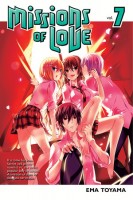My News and Reviews
The end of the year is drawing near and because of the holidays I’ve been traveling quite a bit to see family. Despite being in a part of the country with less than ideal and spotty Internet access for most of the week (middle-of-nowhere Ohio), I still managed to post a few things. The honor of the final in-depth manga review of the year goes to Massive: Gay Erotic Manga and the Men Who Make It, one of my most anticipated releases of 2014. Technically it’s more than just manga—the anthology includes photography, essays, creator profiles, and more. It’s a fantastic work, and highly recommended for anyone even remotely interested in gay manga. Last week I also posted my list of notable releases from 2014. Massive is on the list, as are many other works, including comics and prose in addition to manga. It’s the second year I’ve done a list like this and I enjoyed making it, so I think it’ll probably become an annual feature.
One of the other notable manga that made my list was Makoto Yukimura’s marvelous Vinland Saga. Sadly, Kodansha Comics announced on Twitter that publication of the series has been temporarily suspended. No official explanation or reason has been given at this time (although there has been plenty of speculation), but Kodansha hopes to have more to say about the situation come the new year. Elsewhere online, Mangabrog has posted a lengthy translation of Brutus magazine’s interview with Hajime Isayama from its November 2014 Attack on Titan special issue. And although it’s not exactly manga news, the Smithsonian has begun putting the Pulverer Collection online—an impressive collection of Japanese illustrated books—along with related essays and videos. There were probably some other interesting things happening last week, but like I mentioned I’ve been traveling and visiting with family, so let me know if I missed something!
Quick Takes
 Missions of Love, Volumes 7-9 by Ema Toyama. It’s been a little while since I’ve read Missions of Love, but it didn’t take me very long at all to fall back into the twisted relationship drama of the series. I’m actually glad that I had a few volumes saved up to read all at once since I tend to speed through the manga so quickly. Missions of Love is a series that has me easily turning page after page just to see how audacious the storyline can be without actually crossing the line into something blatantly indecent. The series is smutty and extremely suggestive. The characters are terrible people, selfish and manipulative. Their relationships are a twisted, tangled mess. But I can’t seem to turn away from the outrageousness of the series. Several confessions of love are made over the course of these particular volumes which only serve to complicate further an already complicated situation. And on top of that, Yukina’s preschool teacher, who unintentionally traumatized her when she was his student, is back in the picture which creates even more turmoil. Missions of Love certainly isn’t the most wholesome manga series, but it is an addicting one.
Missions of Love, Volumes 7-9 by Ema Toyama. It’s been a little while since I’ve read Missions of Love, but it didn’t take me very long at all to fall back into the twisted relationship drama of the series. I’m actually glad that I had a few volumes saved up to read all at once since I tend to speed through the manga so quickly. Missions of Love is a series that has me easily turning page after page just to see how audacious the storyline can be without actually crossing the line into something blatantly indecent. The series is smutty and extremely suggestive. The characters are terrible people, selfish and manipulative. Their relationships are a twisted, tangled mess. But I can’t seem to turn away from the outrageousness of the series. Several confessions of love are made over the course of these particular volumes which only serve to complicate further an already complicated situation. And on top of that, Yukina’s preschool teacher, who unintentionally traumatized her when she was his student, is back in the picture which creates even more turmoil. Missions of Love certainly isn’t the most wholesome manga series, but it is an addicting one.
 Punch Up!, Volumes 1-4 by Shiuko Kano. Although Punch Up! is a technically spinoff of Play Boy Blues, which was never completely released in English, knowledge of the earlier series isn’t necessary; Punch Up! stands perfectly well on its own. Kouta is a young but skilled construction worker who, thanks to a missing cat, ends up becoming the roommate of Motoharu, a successful and sought-after architect. Eventually, and not too surprisingly since this is a boys’ love manga, the two of them hook up as well. And since they both enjoy sex, it’s a frequent occurrence in the series. (One of Motoharu’s most prominent and amusing character traits is how horny he is.) Punch Up! also features a lengthy amnesia arc. Normally this isn’t a plot device that I’m particularly fond of, but it actually does provide for some interesting character development in the manga, so I’m a little more forgiving than I might otherwise be. Punch Up! has a fair amount of humor to it and a large cast of interesting secondary characters. And cats. For the most part I enjoyed the series, but there were a few things—like the treatment of Kouta’s older transgender sibling—that left something to be desired.
Punch Up!, Volumes 1-4 by Shiuko Kano. Although Punch Up! is a technically spinoff of Play Boy Blues, which was never completely released in English, knowledge of the earlier series isn’t necessary; Punch Up! stands perfectly well on its own. Kouta is a young but skilled construction worker who, thanks to a missing cat, ends up becoming the roommate of Motoharu, a successful and sought-after architect. Eventually, and not too surprisingly since this is a boys’ love manga, the two of them hook up as well. And since they both enjoy sex, it’s a frequent occurrence in the series. (One of Motoharu’s most prominent and amusing character traits is how horny he is.) Punch Up! also features a lengthy amnesia arc. Normally this isn’t a plot device that I’m particularly fond of, but it actually does provide for some interesting character development in the manga, so I’m a little more forgiving than I might otherwise be. Punch Up! has a fair amount of humor to it and a large cast of interesting secondary characters. And cats. For the most part I enjoyed the series, but there were a few things—like the treatment of Kouta’s older transgender sibling—that left something to be desired.
 Silver Spoon, Season 2 directed by Kotomi Deai. It’s unlikely that Hiromu Arakawa’s award-winning manga series Silver Spoon will ever be licensed in English (although I would love to see it released), but at least the anime adaptation is available. I thoroughly enjoyed the first season of Silver Spoon and the second season is just as good if not better. Silver Spoon is a wonderful series. For me, part of the anime’s appeal is that it actually reminds me of home—I grew up in a small, rural farming community—and I can greatly empathize with the plights of the series’ characters and their families when tough decisions must be made. The importance of family is actually one of the second season’s particular emphases. Farming is not an easy or forgiving profession and deserves much more respect than it is often given. Silver Spoon doesn’t sugarcoat the harsh realities of agricultural work, but at the same time it isn’t overly pessimistic, either. There are humorous, cheerful, heartwarming, and even inspiring elements that nicely balance out the anime’s seriousness and occasional tragedy and sadness. Silver Spoon has great characters and character growth. I only wish that there was more of the series!
Silver Spoon, Season 2 directed by Kotomi Deai. It’s unlikely that Hiromu Arakawa’s award-winning manga series Silver Spoon will ever be licensed in English (although I would love to see it released), but at least the anime adaptation is available. I thoroughly enjoyed the first season of Silver Spoon and the second season is just as good if not better. Silver Spoon is a wonderful series. For me, part of the anime’s appeal is that it actually reminds me of home—I grew up in a small, rural farming community—and I can greatly empathize with the plights of the series’ characters and their families when tough decisions must be made. The importance of family is actually one of the second season’s particular emphases. Farming is not an easy or forgiving profession and deserves much more respect than it is often given. Silver Spoon doesn’t sugarcoat the harsh realities of agricultural work, but at the same time it isn’t overly pessimistic, either. There are humorous, cheerful, heartwarming, and even inspiring elements that nicely balance out the anime’s seriousness and occasional tragedy and sadness. Silver Spoon has great characters and character growth. I only wish that there was more of the series!

Leave a Reply